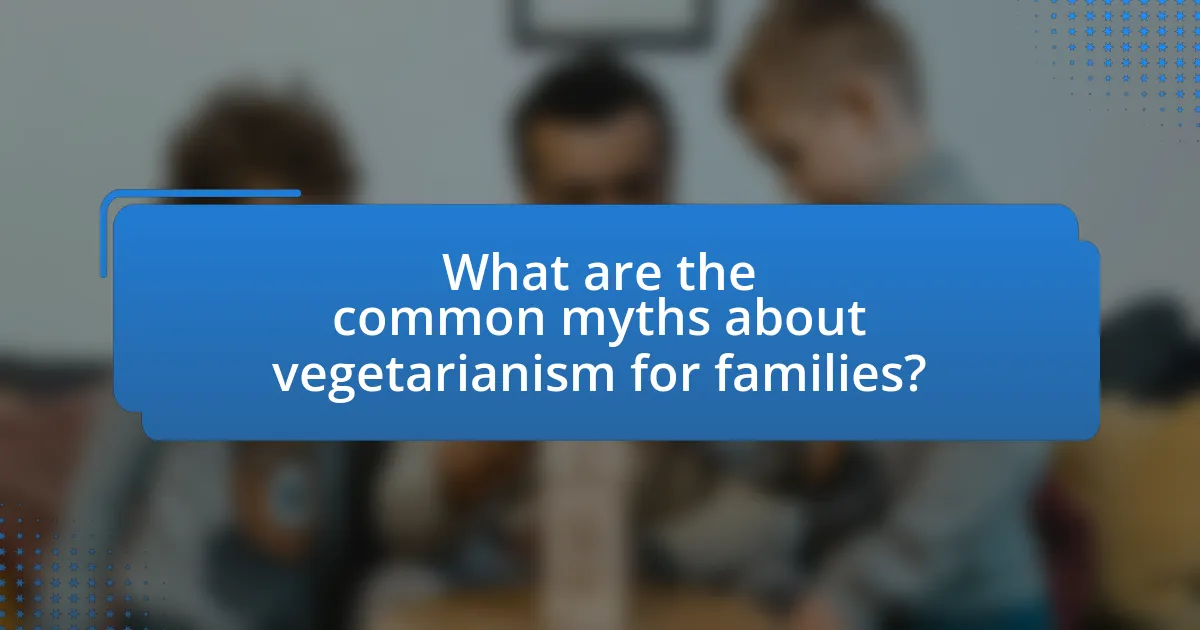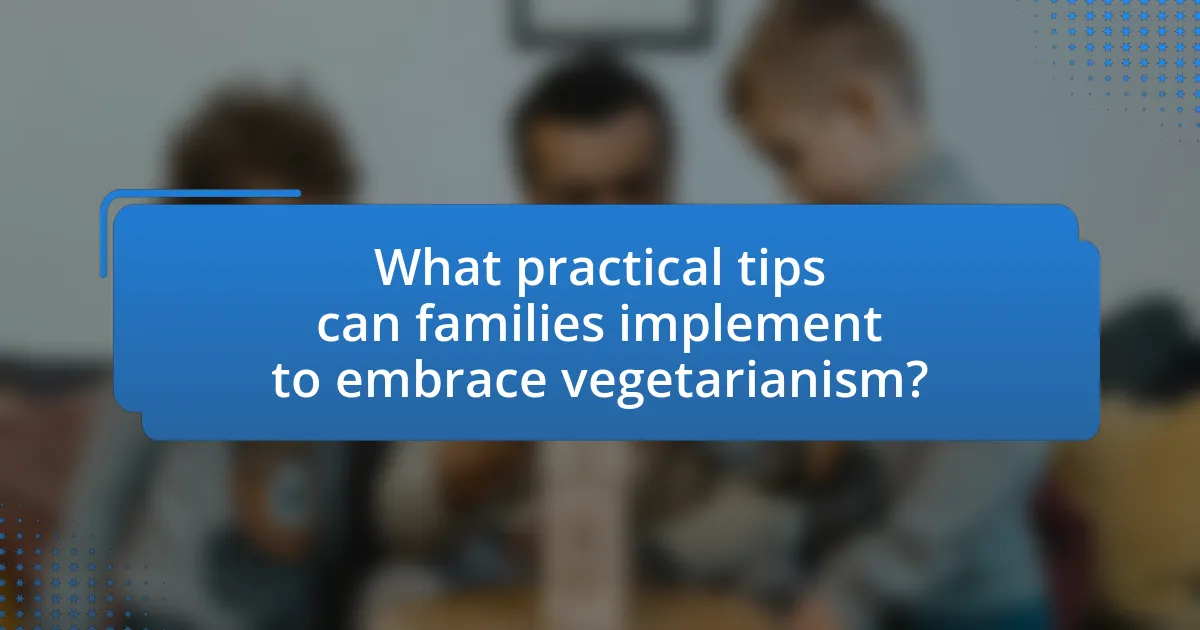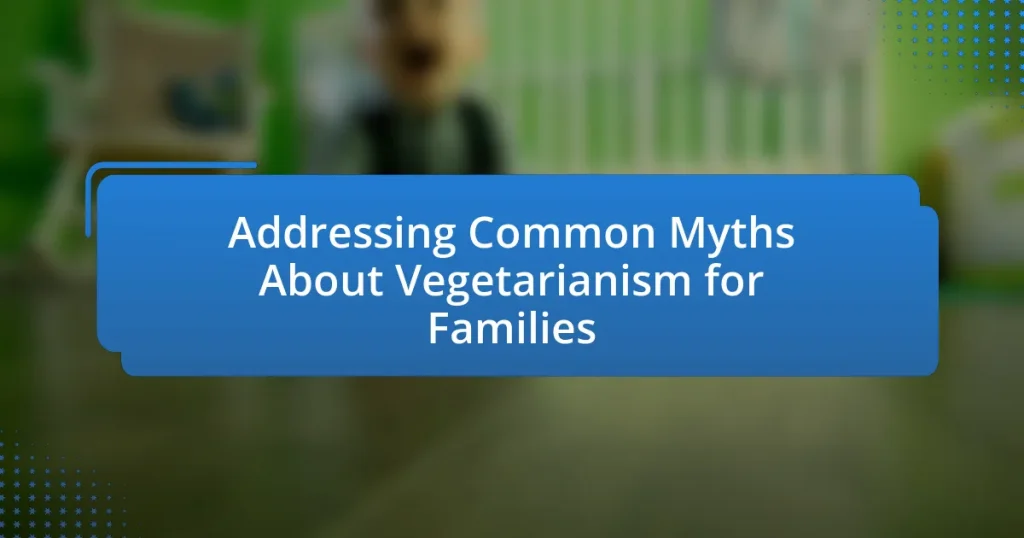The article addresses common myths surrounding vegetarianism for families, focusing on misconceptions about protein intake, nutritional adequacy, and the viability of vegetarian diets for children. It highlights that well-planned vegetarian diets can provide sufficient nutrients and are often cost-effective. The persistence of these myths is attributed to cultural beliefs, misinformation, and educational gaps. Additionally, the article discusses the role of media representation in shaping public perception and offers practical strategies for families to embrace vegetarianism, including meal planning, involving children in cooking, and accessing reliable resources.

What are the common myths about vegetarianism for families?
Common myths about vegetarianism for families include the belief that vegetarian diets lack sufficient protein, that they are too expensive, and that children cannot thrive on a vegetarian diet. Research indicates that plant-based diets can provide adequate protein through legumes, nuts, and whole grains, debunking the myth of protein deficiency. Additionally, studies show that vegetarian diets can be cost-effective, as staple foods like beans and grains are often cheaper than meat. Furthermore, the Academy of Nutrition and Dietetics states that well-planned vegetarian diets are nutritionally adequate for all life stages, including childhood, countering the notion that children cannot thrive on such diets.
Why do these myths persist in society?
Myths about vegetarianism persist in society due to a combination of cultural beliefs, misinformation, and lack of education. Cultural narratives often reinforce traditional dietary practices, making it challenging for alternative diets to gain acceptance. Misinformation spreads rapidly through social media and anecdotal evidence, leading to misconceptions about nutrition and health benefits associated with vegetarianism. Additionally, educational gaps regarding plant-based diets contribute to the persistence of these myths, as many individuals lack access to accurate information about the nutritional adequacy and environmental benefits of vegetarianism.
What cultural factors contribute to misconceptions about vegetarianism?
Cultural factors such as traditional dietary practices, societal norms, and religious beliefs contribute significantly to misconceptions about vegetarianism. In many cultures, meat consumption is deeply ingrained as a symbol of status, strength, and hospitality, leading to the perception that vegetarian diets are inferior or lacking in essential nutrients. For instance, in Western societies, the idea that protein is primarily sourced from meat perpetuates the myth that vegetarians cannot meet their nutritional needs. Additionally, cultural narratives often portray vegetarianism as extreme or radical, which can alienate individuals from adopting such diets. Research indicates that these misconceptions can hinder the acceptance of vegetarianism, as seen in studies highlighting the influence of cultural identity on dietary choices.
How does media representation influence public perception of vegetarianism?
Media representation significantly influences public perception of vegetarianism by shaping societal norms and attitudes towards dietary choices. Positive portrayals in films, documentaries, and social media can enhance the appeal of vegetarianism, presenting it as a healthy and ethical lifestyle. For instance, studies show that documentaries like “Forks Over Knives” have increased interest in plant-based diets by highlighting health benefits and ethical considerations. Conversely, negative representations, such as stereotypes of vegetarians as extreme or unhealthy, can deter individuals from adopting vegetarianism. Research indicates that media narratives can create biases, affecting how people perceive the viability and desirability of vegetarian diets.
What are the most prevalent myths regarding nutrition in vegetarian diets?
The most prevalent myths regarding nutrition in vegetarian diets include the beliefs that vegetarians cannot obtain sufficient protein, that they lack essential nutrients, and that vegetarian diets are inherently unhealthy. Research indicates that a well-planned vegetarian diet can provide adequate protein through sources such as legumes, nuts, and whole grains, debunking the myth of protein deficiency. Additionally, studies show that vegetarian diets can meet all nutritional needs, including vitamins B12 and D, iron, and omega-3 fatty acids, when properly supplemented or sourced from fortified foods. Furthermore, numerous studies, including those published in the Journal of the American Dietetic Association, demonstrate that vegetarian diets are associated with lower risks of chronic diseases, contradicting the notion that they are unhealthy.
Is it true that vegetarian diets lack essential nutrients?
Vegetarian diets do not inherently lack essential nutrients when properly planned. Research indicates that a well-balanced vegetarian diet can provide all necessary nutrients, including protein, iron, calcium, and vitamins B12 and D. For instance, a study published in the Journal of the American Dietetic Association found that vegetarians can meet their nutritional needs through a variety of plant-based foods, fortified products, and supplements. This evidence supports the notion that with careful dietary choices, vegetarian diets can be nutritionally adequate.
How can families ensure balanced nutrition on a vegetarian diet?
Families can ensure balanced nutrition on a vegetarian diet by incorporating a variety of plant-based foods that provide essential nutrients. This includes consuming a mix of fruits, vegetables, whole grains, legumes, nuts, and seeds to cover protein, iron, calcium, and vitamin B12 needs. For instance, legumes such as lentils and chickpeas are excellent protein sources, while fortified plant milks and leafy greens can help meet calcium requirements. Research indicates that a well-planned vegetarian diet can meet nutritional needs and support health, as highlighted in the “Position of the American Dietetic Association: Vegetarian Diets” published in the Journal of the American Dietetic Association, which states that appropriately planned vegetarian diets are healthful and nutritionally adequate.
What misconceptions exist about the impact of vegetarianism on children’s health?
One misconception about the impact of vegetarianism on children’s health is that it leads to nutritional deficiencies, particularly in protein, iron, and vitamin B12. However, numerous studies indicate that a well-planned vegetarian diet can provide all essential nutrients for children. For instance, the American Dietetic Association states that appropriately planned vegetarian diets are healthful, nutritionally adequate, and may provide health benefits in the prevention and treatment of certain diseases. Additionally, vegetarian sources of protein, such as legumes, nuts, and whole grains, can meet children’s protein needs effectively.
Can children thrive on a vegetarian diet?
Yes, children can thrive on a vegetarian diet. A well-planned vegetarian diet can provide all the essential nutrients needed for growth and development. Research published in the Journal of the American Dietetic Association indicates that vegetarian children have similar growth patterns and health outcomes compared to their meat-eating peers when their diets are properly balanced. Key nutrients such as protein, iron, calcium, and vitamin B12 can be obtained from plant-based sources and fortified foods, ensuring that children receive adequate nutrition.
What are the potential health benefits for children following a vegetarian diet?
Children following a vegetarian diet can experience several potential health benefits, including improved nutrient intake, better weight management, and a lower risk of chronic diseases. A vegetarian diet is typically rich in fruits, vegetables, whole grains, and legumes, which provide essential vitamins, minerals, and fiber. Research indicates that children consuming plant-based diets often have higher intakes of dietary fiber, vitamins C and E, and folate, which are crucial for growth and development. Additionally, studies have shown that vegetarian children tend to have lower body mass indexes (BMIs) and reduced risks of obesity-related conditions, such as type 2 diabetes and cardiovascular diseases. These benefits highlight the positive impact of a well-planned vegetarian diet on children’s overall health.

How can families address these myths effectively?
Families can effectively address myths about vegetarianism by educating themselves and engaging in open discussions. By researching credible sources, such as nutrition guidelines from the Academy of Nutrition and Dietetics, families can dispel misconceptions regarding protein intake and nutrient deficiencies. Additionally, sharing personal experiences and cooking together can foster understanding and acceptance of vegetarian diets, reinforcing the idea that a well-planned vegetarian diet can be healthy and balanced.
What strategies can families use to educate themselves about vegetarianism?
Families can educate themselves about vegetarianism by exploring a variety of resources and engaging in discussions. They can start by reading books and articles specifically focused on vegetarian diets, which provide comprehensive information about nutritional needs and meal planning. Additionally, families can attend workshops or cooking classes that focus on vegetarian cuisine, allowing them to gain practical skills and knowledge. Online platforms, such as reputable health websites and vegetarian forums, also offer valuable insights and community support. Research indicates that families who actively participate in these educational activities are more likely to adopt and maintain a vegetarian lifestyle, as they become better informed about the health benefits and ethical considerations associated with vegetarianism.
How can families find reliable resources on vegetarian nutrition?
Families can find reliable resources on vegetarian nutrition by consulting reputable organizations such as the Academy of Nutrition and Dietetics and the American Dietetic Association, which provide evidence-based guidelines and information. These organizations publish resources that include dietary recommendations, meal planning tips, and nutrient considerations specifically for vegetarian diets. Additionally, families can access peer-reviewed journals and books authored by registered dietitians specializing in vegetarian nutrition, ensuring the information is scientifically validated and trustworthy.
What role do cooking classes and workshops play in dispelling myths?
Cooking classes and workshops play a crucial role in dispelling myths about vegetarianism by providing hands-on experience and education. These interactive sessions allow participants to learn about plant-based ingredients, cooking techniques, and nutritional benefits directly from experts, which counters misconceptions such as the belief that vegetarian diets lack protein or variety. Research indicates that experiential learning, such as cooking classes, significantly enhances knowledge retention and alters dietary perceptions, leading to more informed food choices. For instance, a study published in the Journal of Nutrition Education and Behavior found that participants in cooking workshops reported increased confidence in preparing vegetarian meals and a greater understanding of the health benefits associated with plant-based diets.
How can families communicate about vegetarianism with others?
Families can communicate about vegetarianism with others by openly discussing their dietary choices and the reasons behind them. This can include sharing information about health benefits, environmental impacts, and ethical considerations related to vegetarianism. For instance, studies show that vegetarian diets can lower the risk of chronic diseases, which families can highlight to emphasize health advantages. Additionally, families can provide resources, such as articles or documentaries, to educate others about vegetarianism and dispel common myths, such as the misconception that vegetarian diets lack sufficient protein. Engaging in conversations during meals or social gatherings can also create opportunities for dialogue, allowing families to address questions and concerns directly.
What are effective ways to discuss dietary choices with friends and relatives?
Effective ways to discuss dietary choices with friends and relatives include initiating open conversations, sharing personal experiences, and providing credible information. Open conversations create a safe space for dialogue, allowing individuals to express their thoughts and concerns without judgment. Sharing personal experiences can make the discussion relatable and demonstrate the benefits of specific dietary choices, such as vegetarianism, which has been shown to reduce the risk of chronic diseases according to studies published in the Journal of the American Dietetic Association. Providing credible information from reputable sources, such as nutritionists or scientific studies, can help dispel myths and clarify misconceptions about dietary choices, fostering a more informed discussion.
How can families handle criticism or questions about their vegetarian lifestyle?
Families can handle criticism or questions about their vegetarian lifestyle by responding with confidence and providing clear, factual information about their dietary choices. Engaging in open dialogue allows families to explain the health benefits of vegetarianism, such as lower risks of heart disease and obesity, supported by studies from the American Dietetic Association, which states that well-planned vegetarian diets are nutritionally adequate. Additionally, families can share their personal motivations, whether ethical, environmental, or health-related, to foster understanding and respect. By maintaining a calm demeanor and being prepared with facts, families can effectively address misconceptions and promote positive discussions about their lifestyle.

What practical tips can families implement to embrace vegetarianism?
Families can embrace vegetarianism by gradually incorporating more plant-based meals into their diet. Start by designating specific days of the week as “meatless,” which can help ease the transition and encourage creativity in meal planning. Research indicates that families who adopt a gradual approach are more likely to sustain dietary changes long-term. Additionally, involving all family members in meal preparation fosters a sense of ownership and excitement about vegetarian dishes. Studies show that children are more likely to try new foods when they participate in cooking. Lastly, exploring diverse cuisines that naturally emphasize vegetarian ingredients can make the transition enjoyable and flavorful, as many cultures have rich vegetarian traditions.
How can families transition to a vegetarian diet smoothly?
Families can transition to a vegetarian diet smoothly by gradually incorporating more plant-based meals into their weekly routine. This approach allows family members to adjust their taste preferences and explore various vegetarian options without feeling overwhelmed. Research indicates that a gradual shift can lead to better acceptance and adherence to dietary changes, as it reduces resistance and promotes positive experiences with new foods. For instance, starting with one or two vegetarian meals per week and progressively increasing the frequency can help families adapt effectively.
What meal planning strategies can help in adopting vegetarianism?
Meal planning strategies that can help in adopting vegetarianism include creating a weekly menu, batch cooking, and incorporating a variety of plant-based proteins. A weekly menu allows individuals to plan meals in advance, ensuring a balanced intake of nutrients and reducing the likelihood of impulsive, non-vegetarian choices. Batch cooking, which involves preparing large quantities of meals at once, saves time and makes it easier to stick to a vegetarian diet by having ready-to-eat options available. Additionally, incorporating a variety of plant-based proteins, such as beans, lentils, tofu, and quinoa, ensures that nutritional needs are met while keeping meals interesting and diverse. These strategies are supported by research indicating that structured meal planning can lead to healthier eating habits and greater adherence to dietary changes.
How can families involve children in the cooking process to encourage vegetarian meals?
Families can involve children in the cooking process by assigning age-appropriate tasks such as washing vegetables, measuring ingredients, and stirring mixtures, which fosters engagement and interest in vegetarian meals. Research indicates that children who participate in cooking are more likely to try new foods and develop healthier eating habits. A study published in the Journal of Nutrition Education and Behavior found that children who helped prepare meals were more inclined to consume fruits and vegetables, reinforcing the idea that hands-on involvement can lead to a preference for vegetarian options.
What resources are available for families interested in vegetarianism?
Families interested in vegetarianism can access a variety of resources, including cookbooks, online platforms, and community organizations. Cookbooks such as “The Vegetarian Family Cookbook” by Jennifer McCann provide practical recipes and meal planning tips tailored for families. Online platforms like the Vegetarian Resource Group offer educational materials, recipes, and nutritional guidance specifically designed for families transitioning to a vegetarian lifestyle. Additionally, local community organizations often host workshops and support groups that focus on vegetarian nutrition and cooking, fostering a supportive environment for families. These resources collectively help families navigate the transition to vegetarianism effectively.
What are some recommended cookbooks or websites for vegetarian recipes?
Some recommended cookbooks for vegetarian recipes include “Plenty” by Yotam Ottolenghi, which features innovative vegetable dishes, and “Vegetarian Cooking for Everyone” by Deborah Madison, known for its comprehensive approach to vegetarian cuisine. Websites such as Minimalist Baker offer a variety of simple, plant-based recipes, while Oh She Glows provides healthy vegetarian options with an emphasis on whole foods. These resources are well-regarded for their diverse and accessible vegetarian recipes, making them valuable for families exploring vegetarianism.
How can families find local vegetarian communities or support groups?
Families can find local vegetarian communities or support groups by utilizing online platforms such as Meetup, Facebook Groups, and local community boards. These platforms often host events and discussions specifically for vegetarians, allowing families to connect with like-minded individuals. Additionally, local health food stores, vegetarian restaurants, and farmers’ markets frequently have bulletin boards or staff who can provide information about community gatherings and support groups. Research indicates that community engagement can significantly enhance the vegetarian lifestyle experience, fostering a sense of belonging and support among families.
What are some common challenges families face when adopting vegetarianism?
Families often face challenges such as nutritional balance, meal planning, and social pressures when adopting vegetarianism. Nutritional balance can be difficult to achieve, as families must ensure they receive adequate protein, iron, and vitamins typically found in meat. Meal planning becomes complex due to the need for diverse and appealing vegetarian options that satisfy all family members. Additionally, social pressures from friends, family, or cultural norms can create tension, especially during gatherings where meat is the focal point of meals. These challenges highlight the need for education and support to facilitate a successful transition to a vegetarian lifestyle.
How can families overcome social situations that may challenge their dietary choices?
Families can overcome social situations that challenge their dietary choices by proactively communicating their dietary preferences and planning ahead. Open discussions with friends and family about dietary needs can foster understanding and support, making it easier to navigate social gatherings. Additionally, families can bring their own dishes to events, ensuring they have suitable options available. Research indicates that 70% of individuals are more accommodating when they understand the reasons behind dietary choices, such as health or ethical considerations. This proactive approach not only helps families maintain their dietary practices but also encourages a more inclusive environment for everyone involved.
What tips can help families maintain a vegetarian lifestyle during travel or dining out?
Families can maintain a vegetarian lifestyle during travel or dining out by planning ahead, researching restaurants, and communicating dietary preferences clearly. Planning ahead allows families to identify vegetarian-friendly options at their destination, while researching restaurants ensures they choose places that cater to vegetarian diets. Additionally, communicating dietary preferences to restaurant staff can help ensure that meals are prepared according to family members’ vegetarian needs. These strategies are effective as they empower families to make informed choices, ensuring that they can enjoy diverse cuisines without compromising their dietary values.

